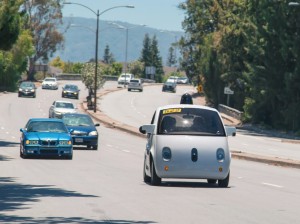Two partners in search of mates? Both Google and Fiat Chrysler have been open in their need to form alliances, and the two companies just might be ready to team up.
According to several online reports, they’re in advanced talks that could lead to Fiat Chrysler putting Google’s self-driving vehicle technology into production. The Silicon Valley firm is already testing its autonomous car software with a fleet of prototypes, but Google officials have repeatedly said they want to find a partner within the auto industry, rather than setting up their own manufacturing operation.
The talks have reportedly been underway for several months, according to the Wall Street Journal, while a separate online report on autoextremist claims negotiations are in late stages and could see Google’s autonomous technology used on a variety of different Fiat-Chrysler products.
(Carmakers, tech companies form alliance to promote autonomous driving. Click Here for more.)
Several industry observers said they were cautiously skeptical about the reports, noting that there was extensive coverage over the winter of a reported tie-up between Google and Ford Motor Co., Ford’s CEO Mark Fields expected to announce a deal at the Consumer Electronics Show in January. Insiders tell TheDetroitBureau.com the two companies did discuss a deal as part of Ford’s increasing focus on mobility solutions, but it is unclear why a deal failed to materialize.
Neither Fiat-Chrysler nor Google are commenting on the latest reports. But such a partnership would appear to have a sound logic, several insiders said.
Google is generally considered to have the industry’s most advanced autonomous vehicle research program, with dozens of prototypes roaming public roads near its operations in Silicon Valley and Austin, Texas. It recently announced plans to expand testing to Nevada, as well. Indeed, Google’s custom-made autonomous prototype is about the same size and shape as a Fiat 500 minicar.
The tech giant has repeatedly said it does not want to actual manufacture vehicles, a move that would likely cost it billions of dollars. Instead, it has expressed interest in licensing its technology.
Fiat-Chrysler CEO Sergio Marchionne, meanwhile, has repeatedly said his company needs to find a partner – though he has generally been thought to be looking for another automotive manufacturer. A number of major competitors, including General Motors, Ford, Renault-Nissan and PSA Peugeot Citroen have apparently turned thumbs down.
One reason why Marchionne appears anxious for an alliance is FCA’s relatively lag in developing technologies considered critical to remaining competitive in the years ahead. That includes both electrified powertrains and autonomous driving systems.
(Boomers skeptical, but Millennials anxious for autonomous vehicles, says new study. Click Here for that report.)
While Google has not yet said when it hopes to put into production its own self-driving software, several competitors have laid out ambitious timetables. Nissan, for example, hopes to have as many as 10 fully autonomous models on the road by 2020. Tesla Motors is already offering a semi-autonomous system, dubbed AutoPilot, and also hopes to have a full version of that technology ready by the end of the decade.
The rapid pace of development has led a handful of states, including Nevada, California, Florida and Michigan, to enact special guidelines for testing autonomous vehicles. And the National Highway Traffic Safety Administration has promised to reveal its own rules within the next few months. It held the second in a series of public hearings on the issue this week.
A key question facing NHTSA is whether to allow the development of vehicles that would be not only autonomous but fully driverless. Google has said it wants to test some versions of its new prototype that would not even have a steering wheel or pedals. Several of those appearing at the two NHTSA hearings have called that concept dangerous and said federal guidelines should continue to require a trained operator capable of taking control of an autonomous vehicle in an emergency.
(Friends and foes speak out at autonomous hearing. Click Here for that report.)



